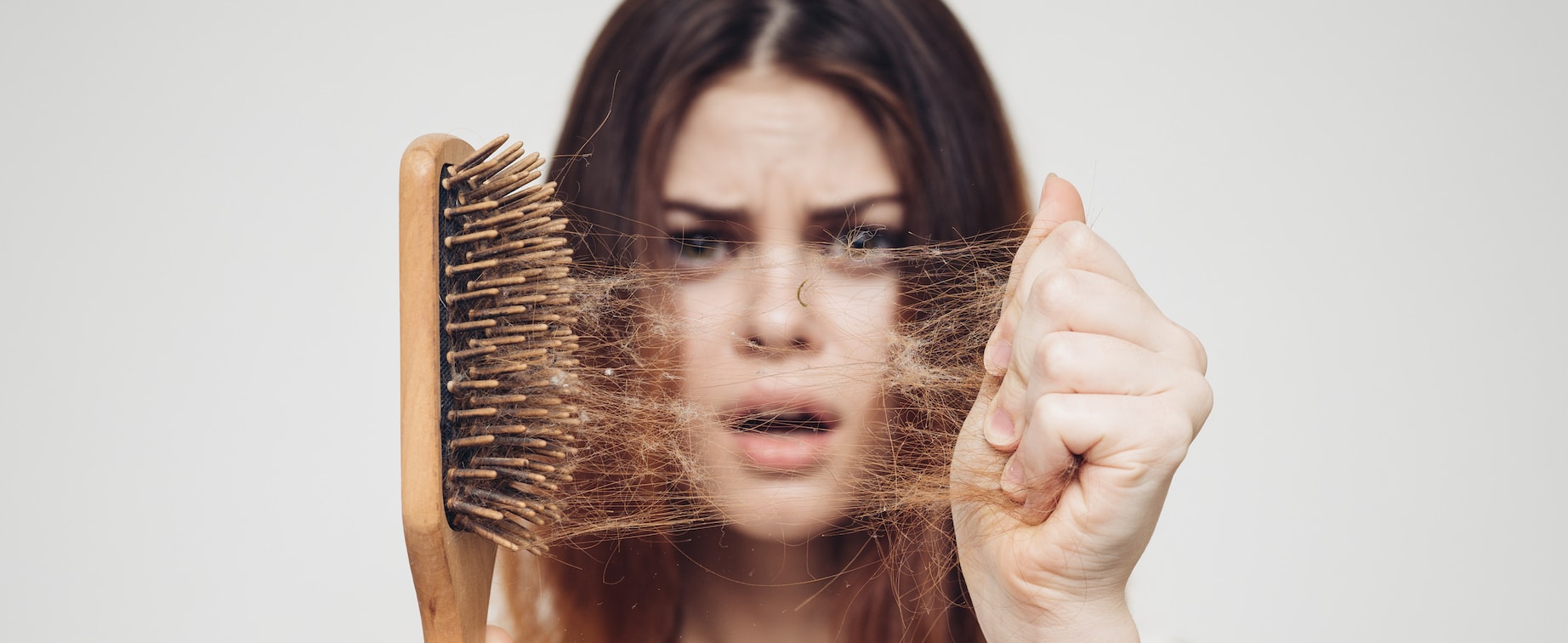Hair Loss Causes
There are several different types of hair loss, including male pattern baldness (androgenetic alopecia), autoimmune disorder hair loss (alopecia areata), telogen effluvium, and hair-pulling disorder (trichotillomania). Some hair loss conditions have overlapping causes, but unique factors like genetics or stress cause others.

Hair loss caused by genetic factors affects up to 50 percent of the population worldwide. 1 Despite being a common condition, there is no cure-all for hair loss. Luckily, mailMymeds carries several medications like finasteride and minoxidil to slow the progression of hair loss and stimulate regrowth. Read on to learn more about how you can slow (or even reverse) hair loss.

How to Stop Hair Loss
Hair loss may be caused by poor nutrition. Telogen effluvium, hair loss caused by an extended resting phase in the growth cycle, can occur from sudden weight loss or insufficient protein intake. 2 This is because a healthy diet is necessary for hair growth, and a nutritional deficiency may impact the structure of your hair. Other hair loss conditions associated with nutritional deficiency include:
• Alopecia areata (AA)
• Androgenetic alopecia (AGA)
• Female pattern hair loss (FPHL) 2
To stop hair loss caused by nutritional deficiency, it is important to ensure enough protein in your diet. Studies show that minimally active people require 0.46 oz of protein for every 1 lb of body weight. 3 While protein is essential, other vitamins and minerals are also necessary for hair growth.
A zinc deficiency is also common, particularly in vegetarians, because zinc is better absorbed when you consume meat. 2 Zinc is vital for many important bodily functions, so it is important to get your zinc levels tested and increase your intake if you are deficient to improve hair loss.
In addition to assessing your diet, your doctor may screen you for any stress or anxiety disorders contributing to your hair loss. As the hair loss articles in our blog discuss, stress is strongly associated with many types of hair loss. Being physically active, drinking less caffeine, and spending time with your loved ones can help reduce stress. If you are affected by hair-pulling disorder, you may benefit from behavior therapy like habit reversal training.

Hair Loss Cure
As mentioned above, no medication can completely cure hair loss. Hair growth is a complex process, and many systems in the body need to work optimally for healthy hair growth. Researchers have looked to plant-based approaches to treat hair loss in recent years.
According to an article published in the Dermatological Research journal, herbal treatments have fewer side effects than synthetic hair loss drugs. 4 For an herbal ingredient to assist in hair growth, it needs to inhibit an enzyme called 5-alpha reductase and improve blood circulation in the scalp. The following plants can inhibit this enzyme:
• Panax ginseng
• Palmetto
• Pumpkin
• Pink and blue ginger
• Red clover 4
Shampoo for Hair Loss
Certain types of hair loss shampoo may assist in hair regrowth. In a study that compared shampoo containing ketoconazole, minoxidil, and an unmedicated shampoo, researchers found that medicated shampoo improved the size and proportion of hair in the growth phase (anagen), leading to denser hair. 5 Shampoo containing ketoconazole or minoxidil may have anti-inflammatory properties that improve alopecia, but more studies are needed to confirm the benefits of medicated shampoo. Hair loss is primarily treated with hair loss drugs like oral finasteride.

Hair Loss Treatment
Oral hair loss medications like finasteride are generally taken once a day for three months or more, depending on your doctor’s directions. Like the herbal treatments mentioned above, finasteride blocks the action of the 5-alpha reductase enzyme. Finasteride also increases testosterone levels, which also contributes to hair growth.
Before starting finasteride for hair loss, discuss the risks and benefits with your doctor. Studies show that finasteride reduces the risk of prostate cancer overall, but it can increase the risk of malignant prostate cancer. 6 Ultimately, it is up to you and your doctor to decide whether the benefits of hair loss treatment are worthwhile.
Although some patients decide that hair loss merely affects their appearance, the impact of hair loss on mental health should not be underestimated. Hair loss may lead to anxiety, depression, and social avoidance. Addressing the root cause of hair loss should always be the priority. You can save on your hair loss prescription through a telemedicine company like mailMymeds, but getting the right treatment starts with a proper diagnosis. Because there are so many different hair loss conditions, your doctor will determine the best hair loss treatment for you.
The content in this article is intended for informational purposes only. This website does not provide medical advice. In all circumstances, you should always seek the advice of your physician and/or other qualified health professionals(s) for drug, medical condition, or treatment advice. The content provided on this website is not a substitute for professional medical advice, diagnosis, or treatment.






